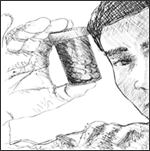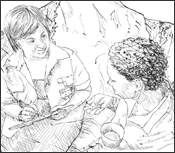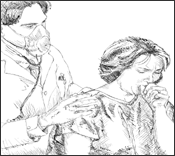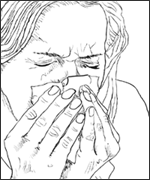Questions and Answers About TB
TB Disease
How is TB disease treated?
There is good news for people with TB disease! It can almost always be treated and cured with medicine. But the medicine must be taken as directed by your doctor or nurse.
If you have TB disease, you will need to take several different medicines. This is because there are many bacteria to be killed. Taking several medicines will do a better job of killing all of the bacteria and preventing them from becoming resistant to the medicines.
The most common medicines used to treat TB disease are:
- isoniazid (INH)
- rifampin (RIF)
- ethambutol
- pyrazinamide

If you have TB disease of the lungs or throat, you are probably infectious. You need to stay home from work or school so that you don’t spread TB bacteria to other people. After taking your medicine for a few weeks, you will feel better and you may no longer be infectious to others. Your doctor or nurse will tell you when you can return to work or school or visit with friends.
Having TB disease should not stop you from leading a normal life. When you are no longer infectious or feeling sick, you can do the same things you did before you had TB disease. The medicines that you are taking should not affect your strength, sexual function, or ability to work. If you take your medicines as directed by your doctor or nurse, they should kill all the TB bacteria. This will keep you from becoming sick again.
What are the side effects of TB disease medicines?
If you are taking medicines for TB disease, you should take it as directed by your doctor or nurse. The medicines may cause side effects. Some side effects are minor problems. Others are more serious. If you have a serious side effect, call your doctor or nurse immediately. You may be told To stop taking your medicine or to return to the clinic for tests.
 The side effects listed below are serious. If you have any of these symptoms, call your doctor or nurse immediately:
The side effects listed below are serious. If you have any of these symptoms, call your doctor or nurse immediately:
- No appetite
- Nausea
- Vomiting
- Yellowish skin or eyes
- Fever for 3 or more days
- Abdominal pain
- Tingling in the fingers or toes
- Pain in the lower chest or heart burn
- Feeling itchy
- Skin rash
- Easy bruising
- Bleeding from gums
- Nose bleeding
- Urine becomes dark or brown in color
- Aching joints
- Dizziness
- Tingling or numbness around the mouth
- Blurred or changed vision
- Ringing in the ears
- Hearing loss
The side effects listed below are minor problems. If you have any of these side effects, you can continue taking your medicine.
- Rifampin can turn urine, saliva, or tears orange. The doctor or nurse may advise you not to wear soft contact lenses because they may get stained.
- Rifampin can make you more sensitive to the sun. This means you should use a good sunscreen and cover exposed areas so you don’t burn.
- Rifampin makes birth control pills and implants less effective. Women who take rifampin should use another form of birth control.
- If you are taking rifampin as well as methadone (used to treat drug addiction), you may have withdrawal symptoms. Your doctor or nurse may need to adjust your methadone dosage.
Why do I need to take TB medicines regularly?
TB bacteria die very slowly. It takes at least 6 months for the medicines to kill all the TB bacteria. You will probably start feeling well after only a few weeks of treatment. But beware! The TB bacteria are still alive in your body. You must continue to take your medicines until all the TB bacteria are dead, even though you may feel better and have no more symptoms of TB disease.
If you don’t continue taking your medicines or you aren’t taking all your medicines regularly, this can be very dangerous. The TB bacteria will grow and you will remain sick for a longer time. The bacteria may also become resistant to the medicines you are taking. You may need new, different medicines to kill the TB bacteria if the old medicines no longer work. These new medicines must be taken for a longer time and usually have more serious side effects.
If you become infectious again, you could give TB bacteria to your family, friends, or anyone else who spends time with you. It is very important to take your medicines as directed by your doctor or nurse.
What is directly observed therapy (DOT)?
The best way to remember to take your medicines is to get directly observed therapy (DOT). If you get DOT, you will meet with a health care worker every day or several times a week. You will meet at a place you both agree on. This can be the TB clinic, your home or work, or any other convenient location. You will take your medicines at this place while the health care worker watches.
 DOT helps in several ways. The health care worker can help you remember to take your medicines and complete your treatment. This means you will get well as soon as possible. With DOT, you may need to take medicines only 2 or 3 times each week instead of every day.
DOT helps in several ways. The health care worker can help you remember to take your medicines and complete your treatment. This means you will get well as soon as possible. With DOT, you may need to take medicines only 2 or 3 times each week instead of every day.
The health care worker will make sure that the medicines are working as they should. This person will also watch for side effects and answer questions you have about TB.
Even if you are not getting DOT, you must be checked at different times to make sure everything is going well. You should see your doctor or nurse regularly while you are taking your medicines. This will continue until you are cured.
How can I remember to take my medicines if I am not on DOT?
The only way to get well is to take your medicines exactly as directed by your doctor or nurse. This may not be easy! You will be taking your medicines for a long time (6 months or longer), so you should get into a routine. Here are some ways to help you remember to take your medicines:
- Take your pills at the same time every day — for example, you can take them before eating breakfast, during a regular coffee break, or after brushing your teeth.
- Ask a family member or a friend to remind you to take your pills.
- Mark off each day on a calendar as you take your medicine.
- Put your pills in a weekly pill dispenser. Keep it by your bed or in your purse or pocket.
NOTE: Remember to keep all medicine out of reach of children.
If you forget to take your pills one day, skip that dose and take the next scheduled dose. Tell your doctor or nurse that you missed a dose. You may also call your doctor or nurse for instructions.
How can I keep from spreading TB?
 The most important way to keep from spreading TB is to take all your medicines, exactly as directed by your doctor or nurse. You also need to keep all of your clinic appointments! Your doctor or nurse needs to see how you are doing. You may need another chest x-ray or a test of the phlegm you may cough up. These tests will show whether the medicines are working. They will also show whether you can still give TB bacteria to others. Be sure to tell the doctor about anything you think is wrong.
The most important way to keep from spreading TB is to take all your medicines, exactly as directed by your doctor or nurse. You also need to keep all of your clinic appointments! Your doctor or nurse needs to see how you are doing. You may need another chest x-ray or a test of the phlegm you may cough up. These tests will show whether the medicines are working. They will also show whether you can still give TB bacteria to others. Be sure to tell the doctor about anything you think is wrong.
If you are sick enough with TB disease to go to a hospital, you may be put in a special room. These rooms use air vents that keep TB bacteria from spreading to other rooms. People who work in these special rooms must wear a special face mask to protect themselves from TB bacteria. You must stay in the room so that you will not spread TB bacteria to other people. Ask a nurse for anything you need that is not in your room.
If you are infectious while you are at home, there are things you can do to protect others near you.
- Take your medicines as directed. This is very important!
- Always cover your mouth with a tissue when you cough, sneeze, or laugh. Put the tissue in a closed bag and throw it away.
- Do not go to work or school. Separate yourself from others and avoid close contact with anyone. Sleep in a bedroom away from other family members.
- Air out your room often to the outside of the building (if it is not too cold outside). TB spreads in small closed spaces where air doesn’t move. Put a fan in your window to blow out (exhaust) air that may be filled with TB bacteria. If you open other windows in the room, the fan also will pull in fresh air. This will reduce the chances that TB bacteria will stay in the room and infect someone who breathes the air.

Remember, TB is spread through the air. People cannot get infected with TB bacteria through handshakes, sitting on toilet seats, or sharing dishes and utensils with someone who has TB.
After you take the medicines for about 2 or 3 weeks, you may no longer be able to spread TB bacteria to others. If your doctor or nurse agrees, you will be able to go back to your daily routine, including returning to work or school. Remember, you will get well only if you take your medicines exactly as directed by your doctor or nurse.
Think about people who may have spent time with you, such as family members, close friends, and coworkers. The local health department may need to test them for TB infection. TB is especially dangerous for children and people infected with HIV. If infected with TB bacteria, these people need medicine right away to keep from developing TB disease.
What are multidrug-resistant TB (MDR TB) and extensively drug-resistant TB (XDR TB)?
Sometimes the TB bacteria are resistant to the medicines used to treat TB disease. This means that the medicine can no longer kill the bacteria. Multidrug-resistant TB, or MDR TB is caused by bacteria that are resistant to two or more of the most important TB medicines: INH and RIF.
A more serious form of MDR TB is called extensively drug-resistant TB (XDR TB). XDR TB is a rare type of TB that is resistant to nearly all medicines used to treat TB disease.
If you do not take your medicines as directed by your doctor or nurse, the TB bacteria may become resistant to a certain medicine. Also, people who have spent time with someone sick with MDR TB or XDR TB disease can become infected with these multidrug-resistant bacteria.
Drug resistance is more common in people who:
- Have spent time with someone with drug-resistant TB disease;
- Do not take all of their medicines as directed by their doctor or nurse;
- Develop TB disease again, after having taken TB medicines in the past; or
- Come from areas where drug-resistant TB is common.
People with MDR TB or XDR TB disease must be treated with special medicines. These medicines are not as good as the usual medicines for TB, and they may cause more side effects. Also, people with MDR TB and XDR TB disease must see a TB expert who can closely observe their treatment to make sure it is working. Treatment takes much longer than regular TB. And, people with both MDR TB and XDR TB are at greater risk of dying from the disease.
- Page last reviewed: November 21, 2014
- Page last updated: December 12, 2014
- Content source:


 ShareCompartir
ShareCompartir